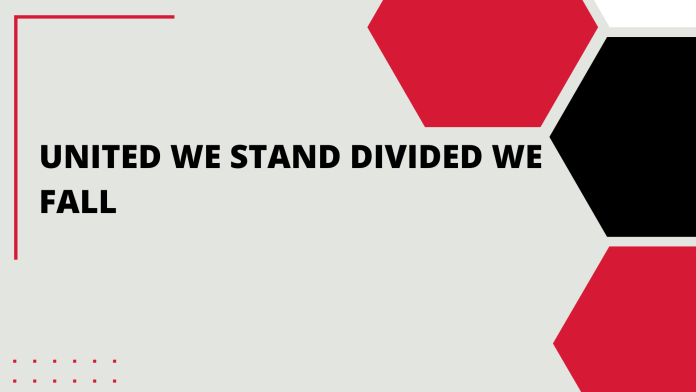In the tapestry of human history, the phrase “United we stand divided we fall” resonates as a timeless truth. This simple yet profound statement encapsulates the essence of strength in unity, a concept that has shaped societies and determined their fates. Let’s delve into the importance of unity across various facets of life, exploring its impact on politics, society, and economics.
Importance of Unity
Unity, the binding force that transforms individuals into a formidable collective, is the cornerstone of progress. There is undeniable strength in numbers, as seen throughout history. Whether it’s a community, a nation, or a movement, achieving common goals becomes more attainable when individuals stand together. Consider the civil rights movement or the fall of oppressive regimes – these are testaments to the power of a united front.
Consequences of Division
Conversely, division weakens the very fabric of communities. Strife and discord hinder progress, creating a scenario where collective potential remains untapped. History serves as a stern teacher, reminding us of societies that crumbled due to internal divisions. The fall of great civilizations often traced its roots to internal strife, highlighting the destructive force of disunity.
Unity in Diversity
Embracing diversity is a key aspect of unity. It’s not about erasing differences but finding strength in them. Diverse communities, bound by a common purpose, often outshine homogenous ones. The richness of varied perspectives and experiences contributes to a robust collective that can withstand challenges.
Political Unity
On a national scale, political unity is paramount for stability. Nations that stand divided find themselves susceptible to external pressures and internal conflicts. Historical events like the American Revolutionary War underline how political unity is not just a choice but a necessity for a nation’s survival.
Social Unity
Communities thrive when social bonds are strong. Social unity fosters a sense of belonging and shared responsibility. In times of crisis, socially connected communities rally together, offering support and resilience that can weather any storm.
Economic Unity
In the globalized world, economic unity is a driving force behind prosperity. Collaborative efforts for economic growth, seen in unions and partnerships between nations, showcase the potential for success when individuals put aside differences for a common goal.
Challenges to Unity
Despite the merits of unity, challenges persist. Factors such as prejudice, mistrust, and differing ideologies can sow seeds of division. Overcoming these challenges requires a concerted effort to bridge gaps and foster understanding.
Role of Leadership
Leaders play a pivotal role in fostering unity. Throughout history, leaders who understood the significance of a united front achieved remarkable feats. Nelson Mandela’s leadership during South Africa’s transition from apartheid is a shining example of how strong leadership can unite a nation.
The Power of Collective Action
Monumental tasks often require collective action. From grassroots movements to international collaborations, the power of individuals coming together is evident. Whether it’s addressing climate change or advocating for social justice, collective action has the potential to bring about transformative change.
Learning from History
History is a guidebook for the present and a cautionary tale for the future. By learning from the mistakes of the past, societies can navigate challenges more effectively and build a foundation for lasting unity.
Promoting Unity in Today’s World
In today’s interconnected world, promoting unity requires intentional efforts. Strategies such as inclusive policies, open dialogue, and education can contribute to fostering unity in diverse settings. By acknowledging and celebrating differences, societies can build bridges and promote harmony.
United We Stand in the Face of Adversity
Adversity often tests the strength of unity. Stories of communities overcoming challenges through solidarity serve as inspirations for others facing difficult times. Whether it’s a natural disaster or a societal crisis, the resilience of united communities is a beacon of hope.
The Ripple Effect of Unity
The impact of unity extends beyond immediate circumstances. Individuals and communities that stand together create a ripple effect of positive change. Acts of kindness, collaboration, and support reverberate, creating a society where the well-being of one is connected to the well-being of all.
Conclusion
In a world that often emphasizes individualism, the timeless wisdom of “United we stand, divided we fall” calls us to reflect on the collective strength that unity brings. From politics to society to economics, the importance of standing together is evident. As we navigate the complexities of the modern world, let’s heed the call for unity, recognizing that our shared future depends on our ability to stand as one.
FAQs
- Why is unity important in today’s diverse world?
- Unity fosters understanding and collaboration, essential for addressing global challenges.
- How can individuals contribute to fostering unity in their communities?
- By promoting open-mindedness, empathy, and actively participating in community initiatives.
- What historical events exemplify the power of political unity?
- Events like the Civil Rights Movement in the U.S. and the end of apartheid in South Africa demonstrate the impact of political unity.
- Is unity synonymous with conformity?
- No, unity celebrates diversity and differences, emphasizing collaboration over conformity.
- Can small acts of unity have a significant impact?
- Yes, small acts of unity contribute to a larger positive impact, creating a ripple effect in communities.

